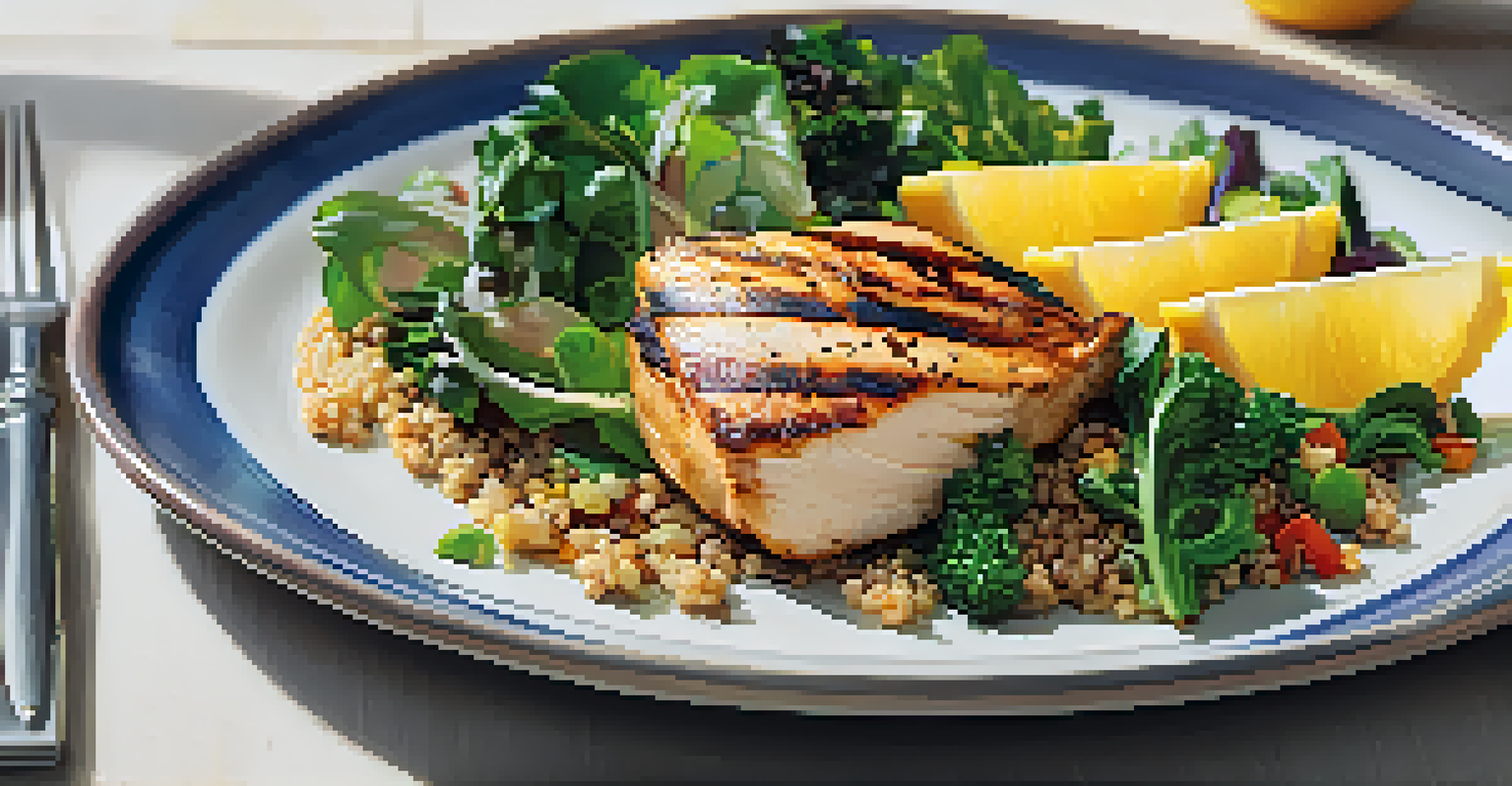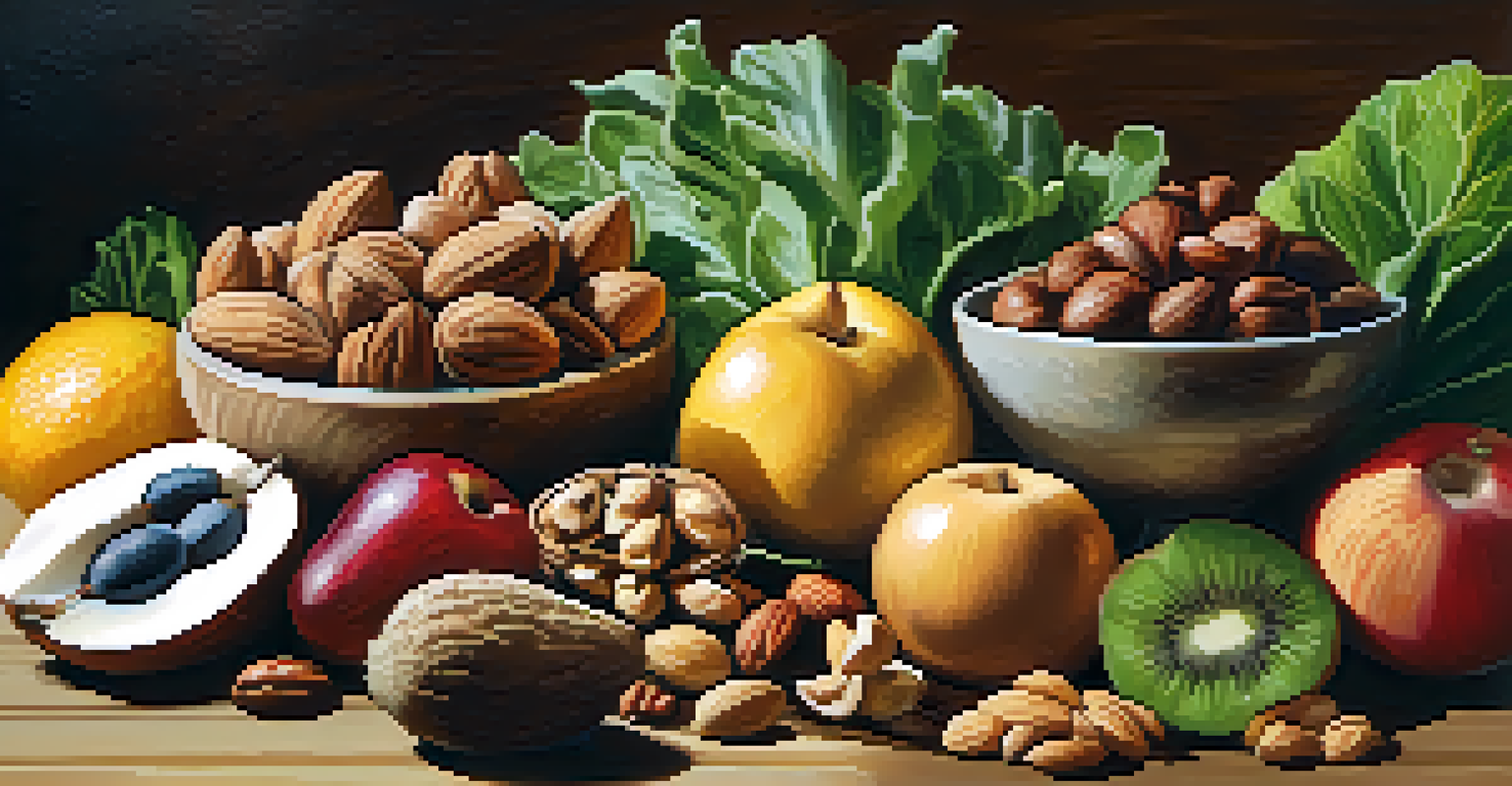Micronutrients Essential for Optimal Martial Arts Performance

Understanding Micronutrients and Their Role
Micronutrients, including vitamins and minerals, are crucial for overall health and performance. Unlike macronutrients, which provide energy, micronutrients support various bodily functions, ensuring that your body operates efficiently. In martial arts, where physical and mental demands are high, these tiny nutrients can make a significant difference.
Let food be thy medicine, and medicine be thy food.
For martial artists, micronutrients help in energy production, muscle recovery, and immune support. They also play a role in maintaining bone health, which is essential for anyone engaging in high-impact activities. Understanding how these nutrients function can empower athletes to make better dietary choices.
Incorporating a variety of micronutrients through a balanced diet can enhance training outcomes and performance. This article will explore the key micronutrients that every martial artist should focus on to optimize their skills and recovery.
Vitamin D: The Sunshine Vitamin
Vitamin D is often called the 'sunshine vitamin' because our bodies produce it when exposed to sunlight. It is vital for bone health, muscle function, and immune system regulation. For martial artists, maintaining adequate levels of Vitamin D can improve overall performance and reduce the risk of injuries.

Research indicates that Vitamin D deficiency can lead to muscle weakness and increased susceptibility to fractures. This is particularly concerning for martial artists who rely heavily on their strength and agility. To ensure sufficient Vitamin D intake, consider spending time outdoors or including fortified foods in your diet.
Hydration is Key for Performance
Staying properly hydrated supports bodily functions and significantly impacts training outcomes.
Supplementation can also be beneficial, especially in regions with limited sunlight. By ensuring optimal Vitamin D levels, martial artists can enhance their physical capabilities and maintain their training intensity.
Iron: Fueling Your Endurance
Iron is an essential mineral that plays a critical role in oxygen transport within the body. Adequate iron levels are vital for endurance athletes, including martial artists, as they help sustain energy levels during intense training sessions. Without enough iron, athletes may experience fatigue and diminished performance.
Nutrition is an essential part of your health and development.
Martial artists, especially females, are at a greater risk of iron deficiency due to factors like menstrual loss and dietary choices. Foods rich in iron, such as lean meats, beans, and spinach, should be prioritized to prevent deficiencies. Pairing these iron-rich foods with vitamin C sources can enhance iron absorption.
Monitoring iron levels through regular blood tests can help martial artists stay informed about their nutritional status. By ensuring sufficient iron intake, they can maintain peak performance and resilience.
Calcium: Strengthening Bones and Muscles
Calcium is best known for its role in building strong bones, but it also supports muscle function and nerve transmission. For martial artists, where falls and impacts are common, maintaining bone health is crucial. Adequate calcium intake helps prevent fractures and supports overall physical performance.
Dairy products, leafy greens, and fortified foods are excellent sources of calcium. For those who are lactose intolerant or following a vegan diet, alternative sources like almonds and tofu can provide this essential nutrient. It's vital to ensure that calcium needs are met, especially during periods of intense training.
Focus on Key Nutrients
Prioritizing nutrients like Vitamin D, iron, and magnesium can optimize strength, endurance, and recovery.
Combining calcium with vitamin D enhances its absorption, making it even more effective. By prioritizing calcium, martial artists can protect their bodies and stay strong during rigorous training.
Magnesium: The Relaxation Mineral
Magnesium plays a crucial role in muscle relaxation and recovery, making it essential for martial artists. It helps prevent muscle cramps and promotes better sleep, which is vital for recovery after intense training sessions. Having adequate magnesium levels can lead to improved performance and reduced fatigue.
Rich sources of magnesium include nuts, seeds, whole grains, and leafy green vegetables. Including these foods in daily meals can help martial artists meet their magnesium requirements. Additionally, magnesium can aid in energy production, allowing for more effective workouts.
Supplementing with magnesium may also be beneficial for those who struggle to get enough from their diet. By ensuring adequate magnesium intake, martial artists can enhance their recovery and maintain their training intensity.
Zinc: Supporting Immune Function
Zinc is a trace mineral that plays a vital role in immune function, healing, and protein synthesis. For martial artists, a strong immune system is essential when training hard, as it helps prevent illness that could sideline their training. Adequate zinc levels support optimal recovery and overall well-being.
Foods rich in zinc include meat, shellfish, legumes, seeds, and nuts. Including these foods in your diet can help maintain sufficient zinc levels, especially during periods of intense training when the body is under stress. Zinc also contributes to muscle repair, aiding recovery after strenuous workouts.
Micronutrients Boost Martial Arts
Essential vitamins and minerals enhance performance, recovery, and overall health for martial artists.
Regularly consuming zinc-rich foods can enhance performance by supporting recovery and reducing the risk of illness. By prioritizing zinc intake, martial artists can focus on their training without the worry of falling ill.
B Vitamins: Energy and Focus Boosters
B vitamins are a group of essential nutrients that play a significant role in energy production and mental focus. For martial artists, maintaining high energy levels and mental clarity is crucial during training and competitions. B vitamins, particularly B6, B12, and folate, support optimal performance by converting food into energy.
Sources of B vitamins include whole grains, meat, eggs, and leafy greens. Incorporating a variety of these foods into daily meals ensures that martial artists receive adequate amounts of these essential vitamins. Additionally, B vitamins can help reduce fatigue and improve cognitive function.

By focusing on B vitamin intake, martial artists can enhance their physical and mental performance. A well-rounded diet rich in B vitamins can support sustained energy levels and sharper focus during training.
Hydration: The Often Overlooked Nutrient
While technically not a micronutrient, hydration is essential for optimal performance in any sport, including martial arts. Proper hydration supports all bodily functions, including temperature regulation, joint lubrication, and nutrient transport. Dehydration can lead to fatigue, decreased concentration, and impaired performance.
Martial artists should prioritize hydration before, during, and after training sessions. Water is the best option, but electrolyte-rich drinks can also be beneficial, especially during intense workouts. Monitoring fluid intake and ensuring adequate hydration can significantly impact performance and recovery.
By making hydration a priority, martial artists can enhance their training outcomes and overall health. Remember, a well-hydrated body is a key component of peak performance!